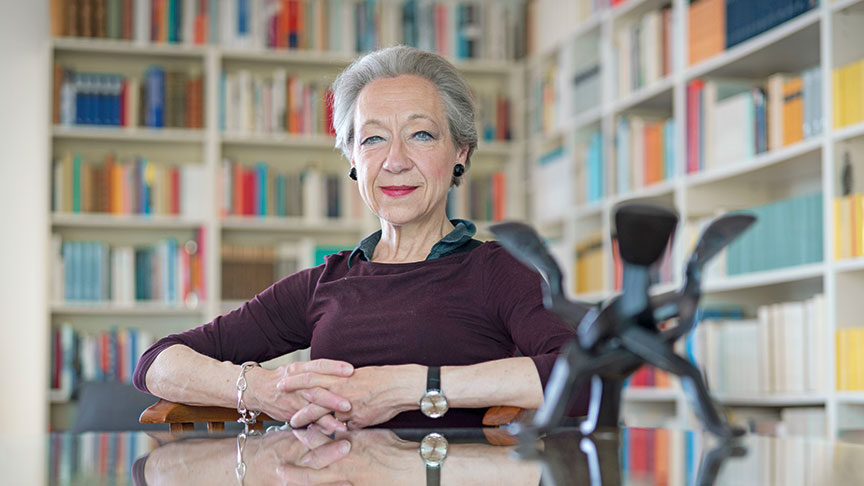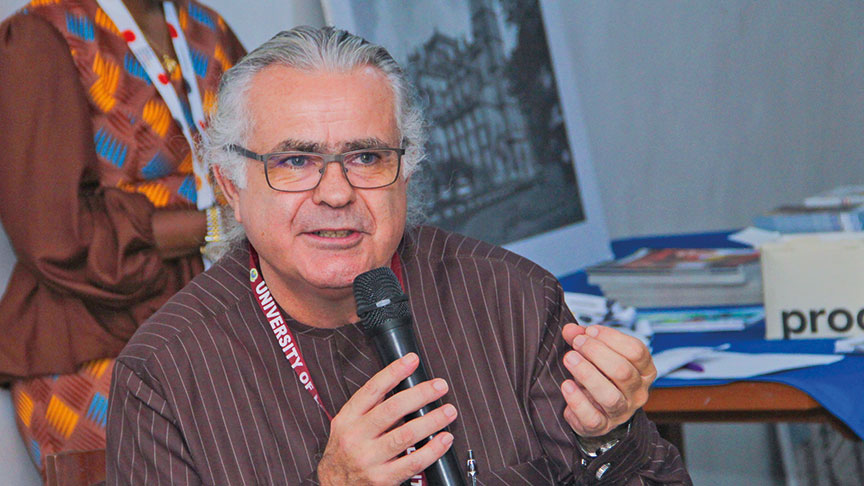Text: Sabine Giehle
German studies as a bridge to the world
German is widely spoken worldwide, and German studies is an international and transdisciplinary subject. Experts report on what they do to promote German around the world – and how Germany also profits from this.
German is spoken either as a native tongue or second language by an estimated 130 million people, and around 15.5 million people around the world are learning German as a foreign language. One of the most important jobs of the DAAD is to promote this and thereby cultivate links with cultures and people all over the world.
The DAAD’s German Language, Literature and Culture: Institutional Partnerships Worldwide (GIP) programme uses Federal Foreign Office funds to internationalise German studies in Germany and worldwide. To date, a total of 27 GIP have been established between institutes that offer German studies or German as a foreign language at German higher education institutions and their partner institutes abroad.
International ties via German studies
Professor Gesine Lenore Schiewer holds the Chair of Intercultural German Studies at the University of Bayreuth and is also president of the Gesellschaft für interkulturelle Germanistik, the association for intercultural German studies. Since 2017, she has cultivated institutional partnerships with countries such as Benin, Togo and Ghana. “We work together on a variety of levels, promoting exchange between both students and academics. The GIP with the three West African states in particular involves considerable exchange between the partner countries,” explains Gesine Schiewer. “In this context, German serves as a bridge between anglophone Ghana and the francophone partner countries of Togo and Benin.”
Great interest in German
Dr Gerald Heusing, an African studies expert and DAAD Lecturer, has lived in Africa for many years – first in Uganda, then in Ethiopia and now in Nigeria, where he works at the University of Lagos. “Unlike English,” Heusing explains, “German never had any official or functional role in these countries, nor did it ever serve as an academic language.” Nonetheless, German is taught in Uganda, Ethiopia and Nigeria as an optional additional subject or second foreign language. And there is great interest in German at schools, academic institutions and in other contexts: data compiled by Germany’s Federal Foreign Office shows that in Nigeria alone more than 10,000 people were learning German in 2020.
As Heusing explains, there are all kinds of different reasons for this interest, ranging from a desire to attain an additional professional qualification or pursue a career in tourism to family-related reasons such as a wish to join family members already in Germany or connect with German-speaking ancestors.
Considerable potential for partnerships
As far as cooperation with German universities – particularly in Nigeria – is concerned, Heusing still sees “considerable hidden potential”. This has already led to 32 collaborative ventures between 19 of the country’s universities and German partners. One of the Nigerian-German higher education collaborations that has already been established is the SDG Graduate School Urban Lab. It contributes to the Sustainable Development Goals (SDG) of the United Nations and is based on a partnership between the University of Lagos, the South African University of Witwatersrand and Technische Universität (TU) Berlin. Among other things, the DAAD provides scholarships for the Master of Urban Management and the PhD in Sustainable Urbanisation.
Learning through exchange
The German side can also learn a lot from such international exchange, stresses Gesine Lenore Schiewer. She talks about another GIP that her institute runs with Poland and Colombia, which focuses particularly on international participation among young generations. The programme explores and tackles problems that result from structural and content-related changes in everyday social practices, such as trends towards social radicalisation in Germany, Colombia and Poland.
“We develop curricula that address such issues with a view to strengthening democratic structures,” explains Gesine Schiewer. “We in Germany can learn a great deal from sharing experiences with other countries that have been confronted with serious tensions and conflicts for decades.”
As far as German studies in the international context is concerned, Gesine Schiewer believes that one of its key roles is to help us understand the societies of partner countries “and to work on topics that are relevant there. That’s why it is so very important for German studies to follow an inter- and transdisciplinary approach”.
An opportunity for the German language
German is also popular in the Baltic countries, where more than 67,000 people in Estonia, Latvia and Lithuania are learning the language. “After English and Russian, German is the most important foreign language there, though the three languages have very different roles,” says Dr Heiko F. Marten. Until 2022, he was the head of the DAAD Information Centre for Estonia, Latvia and Lithuania in Riga and is now a research associate at the Leibniz Institute for the German Language (IDS). “The German language is viewed extremely positively in the Baltic states.” And how has the war in Ukraine changed the relationship of the Baltic peoples to German? “Politically speaking, Russian is seen as increasingly problematic,” explains Marten. “For this reason, Latvia has now introduced a policy specifically aimed at reducing the presence of Russian in schools. German is likely to profit from this.” Marten is already seeing indications that much is being done to promote the training of German teachers. “This is an opportunity for the German language and for German studies.” ―
If you would like to learn more about Dr Heiko F. Marten’s research, the role that German plays in the Baltic countries and language policy in Germany, read our interview online.




